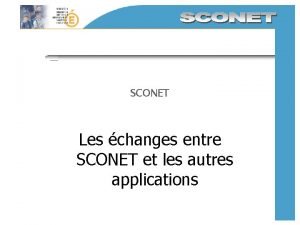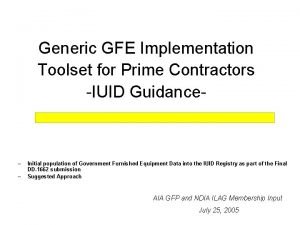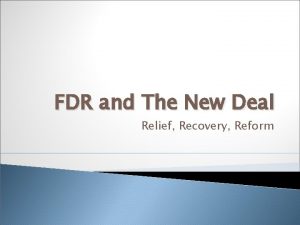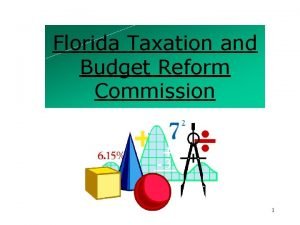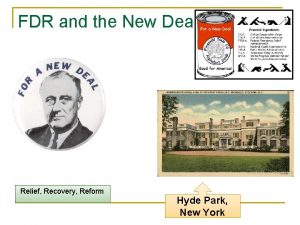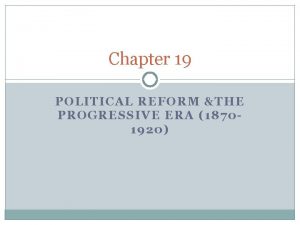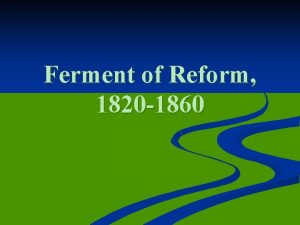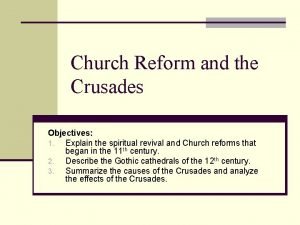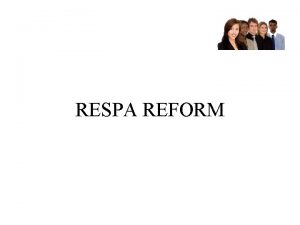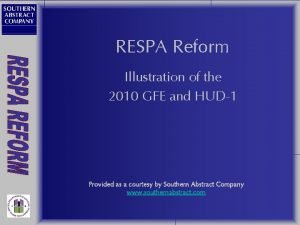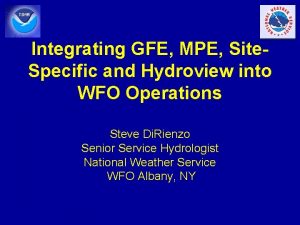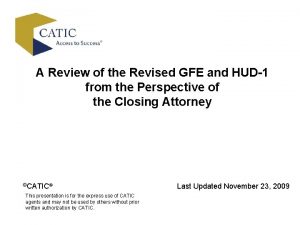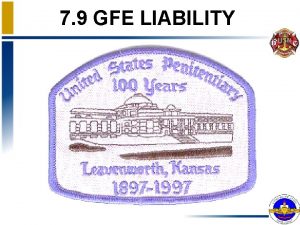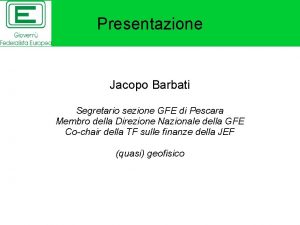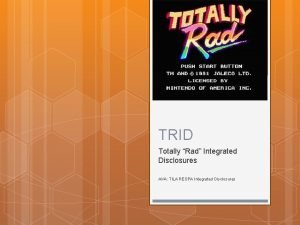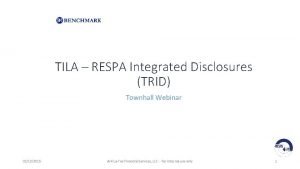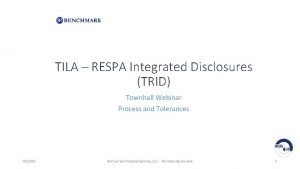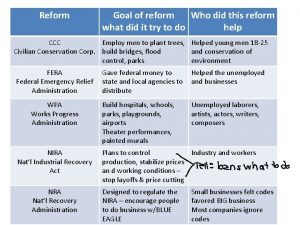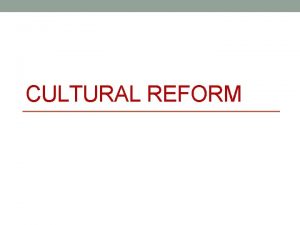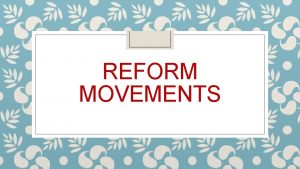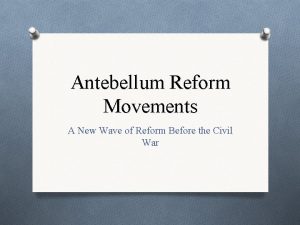Welcome To RESPA REFORM and the New GFE


































































- Slides: 66

Welcome To RESPA REFORM and the New GFE and HUD 1 Presented by Michael Deery January 13 th 2010

What is RESPA Reform? RESPA Reform was enacted by the U. S. Department of Housing and Urban Development (HUD). The final rule was published on 11/17/08 with the goal of providing consumers greater protection surrounding the terms, fees and settlement charges of their mortgage loan. The new RESPA rules apply to loan applications taken as of 1/1/10. 2

Principles of RESPA Reform Primary Goals include: • Key final terms of the loan disclosed to the borrowers at closing • Preserve a competitive market for all settlement service providers • My Take…Hud has missed the boat here, this has made the loan process more confusing. Now never than before, does the borrower need to work with an experienced loan officer that will walk them through the loan process! One simple miscalculation and the loan blows up! 3

Important Changes • • • New Good Faith Estimate Disclosure Timing of upfront fee collection Changed Circumstances Concept New Tolerance and redisclosure requirements Greater emphasis on communication between the broker and the lender at time of application through closing • New HUD-1 Settlement Disclosure 4

The New Good Faith Estimate! Only our lovely Government could have created something like this!

New Definition - Application Lenders consider an application complete for RESPA, GFE purposes when the originator (mortgage broker or lender) has the following: – Borrower’s name – Borrower’s monthly income – Borrower’s social security number – Property Address – Estimated value of the property – Loan Amount 6

At Application The GFE must be given to the borrower within 3 business days of receipt of these 6 pieces of information. The broker is responsible for preparation of the Good Faith Estimate and any redisclosure until the complete loan file is submitted for underwriting and approval. If a transaction involves more than one mortgage loan, a separate GFE for each loan is given to the applicant. 7

Intent to Proceed RESPA states the borrower must express their intent to proceed prior to: • Collection of any upfront fees other than a credit report fee, and • Verification of any information provided by the applicant The new Good Faith does not have signature lines. The borrower does not sign the GFE, they can initial receipt of the GFE by their name on the first page but this is not required. There can be no other attachments to the GFE, no other document in the file is to be named GFE. 8

Certification of Intent to Proceed

Good Faith Estimate (GFE) • The new GFE is designed to create more transparency regarding key loan terms, fees and charges to encourage the borrower to shop and compare terms offered by different lenders. • The originator is responsible for providing accurate figures of the true costs of the loan at application, avoiding surprises at settlement. • The new GFE includes all charges typically paid by a borrower regardless of who is paying the charges (borrower, seller, lender) on an individual transaction. • For applications taken beginning 1/1/10 or only the standardized GFE form defined by RESPA may be used. If a loan has an application date prior to 1/1/10, we can use the previous GFE and the settlement agent will use the old HUD-1. 10

Good Faith Estimate (GFE) • Loan Originators, (mortgage brokers and lenders) are bound to the settlement charges and terms listed on the GFE initially provided to the borrower, subject to certain tolerances. 11

Pre-Approvals for Purchases If there is no subject property, the transaction is not considered an application for RESPA purposes. A GFE cannot be issued. Verification and/or processing of the loan request cannot begin until the borrower selects a property, receives the GFE and expresses intent to continue with the loan. 12

GFE – Getting it Right Dates, Fees, Details What you need to know

GFE – Page 1 The first page of the GFE acts as an overview of the loan transaction. A snapshot of the terms of the loan for which the borrower applied. • Included on the first page: – – loan originator contact information, important dates, summary of loan terms total of estimated settlement charges. . 14

GFE – Getting it Right, Page 1 Contact Information In the first section you must fill in the name, business address, phone number and email address of the loan originator completing the GFE. • Broker contact information is shown until the time the processed loan file is submitted for approval, then lender contact information will be entered In the second column the borrowers’ names, property address and the date the GFE is prepared is entered. 15

GFE – Getting it Right, Page 1 Important Dates The important dates section notifies applicants of the timeframe the terms quoted at application are available to them. When a loan is locked the GFE is reissued because this section updates to give the borrowers accurate information. 16

GFE - Getting it Right, Page 1 -Important Dates Line 1. Enter the date through which the quoted interest rate will be available. You may enter a date and time, or if the rate is floating enter N/A. If the loan is locked the lock expiration date is shown here. Line 2. RESPA requires all other settlement charges quoted at time of application to be binding for a minimum of 10 business days. Do not count Saturday and Sunday if you are not open for business on those days. If the rate is locked, the lock expiration date is shown here. Enter that date here. Line 3. Enter the term of the rate lock here. If the loan is floating enter N/A. This field will be updated at the time the loan is locked and a new GFE reissued. Line 4. This field represents the number of days prior to settlement that the rate must be locked. If the loan program requires a greater number of days, enter that here. 17

GFE –Page , Summary of your loan This section of the GFE highlights critical terms of the loan to the consumer. Line 1. The loan amount applied for Line 2. The term of the loan in years Line 3. The interest rate shown on the note at closing. If the loan is a 3 -2 -1 buydown the interest rate on the not the buydown rate is quoted. For an ARM loan, the initial interest rate is quoted. Line 4. The initial monthly payment amount of principal, interest and mortgage insurance. If the loan program has other than monthly payments, total the amount of payments made in a year and divide by 12. That number goes here. 18

GFE Page 1 Summary of your loan This section of the GFE highlights critical terms of the loan to the consumer. Line 5. If the interest rate can rise, check Yes and enter the maximum interest rate over the life of the loan and the number of months before the first interest rate change. If a fixed rate loan check No. Line 6. If a loan has negative amortization, check the box Yes and enter in the maximum amount the principal can rise. We do not offer negatively amortizing loans at this time. Check the box No. Line 7. If a fixed rate loan check No. If an ARM, enter the month of the first increase and the maximum associated payment amount. The maximum payment over the life of the loan is also shown. Line 8. Check Yes or No to show whethere is a prepayment penalty. If yes, state the maximum amount of the prepayment penalty, assume payoff on day 1. Interest paid through the end of the month on an FHA loan at the time of payoff is not considered a prepayment penalty. Line 9. Check Yes if the loan has a balloon payment and enter the amount and number of years until the balloon is due, otherwise check No. 19

GFE – Getting it Right, Page 1 Escrow Account Information It is important for a consumer to know if their loan payment includes impounds for taxes and insurance. This box tells the consumer to ask their loan officer for information regarding impounds. The payment quoted in this section is only principal, interest and mortgage insurance. Check the box No or Yes depending on the situation. If the loan includes an impound account, information regarding impounds is on page 2 of the GFE. 20

GFE – Getting it Right, Page 1 Summary of Settlement Charges The total charges shown in boxes A and B are detailed on page 2 of the GFE. This section gives the borrower the total amount of estimated settlement charges from both origination and other settlement charges. 21

GFE Page 2 • • • Page 2 displays loan fees as subtotals by service provided to the consumer, another tool for shopping for the best loan. The fees quoted at time of application on page 2 are compared to the charges at closing on the HUD-1 to insure none have increased at closing more than is allowed by the regulation. The lender is bound to the fees quoted at application. In a wholesale transaction, the lender is not able to ‘unbind’ the agreement between the broker and the applicant. 22

GFE Page 2, Your Adjusted Origination Charges Block 1. Our origination charge The dollar amount shown in this block represents all compensation paid to the broker and lender. This total is not dependent on who is paying the compensation. For example lender paid compensation to the broker as well as seller paid fees benefiting the broker or lender are included in the total. 23

GFE Page 2, Your Adjusted Origination Charges Enter the total of the following fees in block 1: YSP, or Lender to Broker Compensation Origination Fee Administration Fee Underwriting Fee Messenger Fee SSN/Tax Return Verification Fee Employment Verification Fee MERS Registration Fee Commitment Fee Broker Fee Processing Fee Application Fee Courier Fee Wire Fee Lock Fee Extended Lock Fee Doc Prep Fee 24

GFE Page 2, Your Adjusted Origination Charges Block 2: Your credit or charge (points), for the specific interest rate chosen Block 2 represents the fees paid or credit given to the borrower for the interest rate. This box reflects the net impact of any discount, YSP or other loan level price adjustment. Important to note: boxes 2 and 3 cannot be checked at the same time. The fee or credit shown is the ‘net’ impact of all charges related to the interest rate chosen. 25

GFE Page 2, Your Adjusted Origination Charges Check one of three boxes • Box 1 – wholesale, do not check. • Box 2 – if there is a credit for the interest rate, check the box, enter the dollar amount of the credit and the interest rate, carry the dollar amount of the credit as a negative number into the column. • Box 3 - if there is a charge for the interest rate, (discount points and loan level price adjustments) check the box, enter the dollar amount of the charge and the interest rate, carry the dollar amount as a positive number into the column. Again, the net charge or credit is reflected – do not choose both a credit and a charge. The amount from block 1 is added to the amount in block 2 and the total shown in box A. 26

GFE Page 2, Your Adjusted Origination Charges Impact of a Lock: Once the loan is locked, the interest rate dependent charges only are updated. These are the net charges/credits shown in block 2. Origination Fees as disclosed in block 1 are not allowed to increase. These fees represent the charges involved in processing a loan and do not include rate dependent fees. We will address changed circumstances later in the presentation. 27

GFE Page 2, Your charges for All Other Settlement Services This section lists each third party settlement provider selected by the originator other than title. The description of the service, not the provider name, and the charge for each must be included. The total of all these fees is entered in the right hand column. Examples include: credit report, appraisal review, flood certification, property tax services, FHA upfront MIP and VA funding fee. These fees are limited to a 10% increase at close unless there is a changed circumstance. Relationships are huge Brokers and Loan Officers need to create working relationships with their vendors to get accurate estimates at the time of application. 28

GFE – Getting it Right, Page 2 Your charges for All Other Settlement Services All fees related to closing go in box 4 and is shown as a total. The fees are not itemized individually. Included in this box are fees such as title search, examination and endorsements, lender’s title insurance fee, delivery fee, settlement or escrow fee, sub escrow fee, notary fee, messenger fee, email fee, and attorney’s fees for documents needed at close (not loan documents). Any fee relating to the settlement, escrow or title services except for owners title insurance goes here. Again, it is important for the Broker and Loan Officer to create close working relationships with the title companies in the borrower’s neighborhood so these fees are as accurate as possible. 29

GFE – Getting it Right, Page 2 Your charges for All Other Settlement Services In a purchase transaction the fee for owner’s title insurance and any endorsements, independent of who is paying for them, is entered here. In a refinance, enter NA. 30

GFE – Getting it Right, Page 2 Your charges for All Other Settlement Services Any required third party services that the borrower can shop for is listed here. Describe the service, (for example, pest inspection, survey) and list each estimated charge. The total goes in the right hand column. For services disclosed in boxes 4, 5 and 6, if borrowers are permitted to shop for a third party settlement services they must be given a separate written list of settlement service providers at the time of the GFE. This list contains the names of providers the estimates were based on. This list is prepared on a separate piece of paper provided along with the GFE. The broker is responsible for preparation of this list and submission at the time of application. 31

GFE – Getting it Right, Page 2 Your charges for All Other Settlement Services Box 7 – enter any state and local recording fees for the loan and any required title documents. Communication with the settlement agent prior to preparation of the GFE is important so the estimate is accurate. Box 8 – Transfer Taxes represents the sum of all state and local government fees that will be charged at settlement based on the loan application. This fee must be exact and there is zero tolerance for charging more than is initially quoted per RESPA. Communication with the settlement agent is important for accuracy. 32

GFE – Getting it Right, Page 2 Your charges for All Other Settlement Services Box 9 represents the estimate of the deposit that will be required for the borrowers’ initial impound account at closing. The estimate includes deposits for Property taxes Hazard Insurance Flood Insurance Mortgage Insurance Any other impounds. 33

GFE – Getting it Right, Page 2 Your charges for All Other Settlement Services The estimated per diem interest collected at closing is shown in box 10. In box 11, list the type of Hazard Insurance and the estimated amount, carry the total to the right hand column. Insurance includes, hazard, fire, flood, earthquake etc. 34

Tolerance 10% Tolerance: The total of charges in blocks 3, 4, 5, 6 and 7 can increase up to 10% if the service provider is identified by the loan originator. There is no tolerance limitation if the borrower selects their own service provider in blocks 4, 5 and 6. Transfer Taxes, block 8, has zero tolerance, the fee cannot increase at settlement. 35

GFE – Getting it Right, Page 3 This part of the GFE is informational for the consumer. It tells the consumer which fees can and cannot change and the associated tolerance. If at closing there is a change greater than the tolerances allowed, the lender is responsible for the correction and that correction is shown on the HUD-1. Communication with brokers and settlement agents prior to documents being released is the key to success. 36

GFE – Getting it Right, Page 3 The consumer can use the tradeoff table to compare loan offers from the same lender. 37

GFE – Getting it Right, Page 3 The shopping chart was created for the consumer to use to compare offers from all lenders during the 10 business day period described earlier. I recommend going with one lender that will be able to walk you through this new GFE loan process. The cheapest loan will equal poor service and most problems guaranteed! 38

GFE – Getting it Right Settlement Servicers Providers List Anytime the borrower is allowed to shop for or choose a service provider, the Settlement Service Providers List must be given along with the GFE showing providers that are available to provide the services described. Key Points: • The Settlement Service Providers List is given to the applicant with each Good Faith Estimate • The list must include at least one provider for each required service along with contact information • The providers given must offer their services in the borrower’s neighborhood. • The applicant is not required to select from the list provided. • The borrower must notify the loan originator of his choice of service providers for each service within 10 business days of the application date. • If the borrower chooses a provider on the Settlement Service Providers List the fee at closing is limited to a 10% increase. If the borrower chooses their own provider then the fee is not limited. 39

Settlement Service Providers Form Sample 40

HUD Booklet Hud also published a new booklet to be sent to applicants with the Good Faith Estimate. The revised booklet provides the borrower expanded information about shopping for a mortgage and understanding the home purchase process. The format and contents of the new Good Faith Estimate are included in the description of the process and are required to be used with any mortgage loan application taken on or after January 1, 2010. The HUD Booklet can be found at www. hud. gov/respa. 41

TILA and RESPA • TILA differences – TILA requires itemization of individual fees – Seller paid fees are not included in the APR – The YSP is not included as a prepaid finance charge for APR purposes – No duplication of fees by broker and lender – Individual Fees still used in High Cost calculations – The Initial Disclosure package does not include the GFE. It is delivered separately by the broker. – Timing – wait periods – RESPA fees are ‘binding’ for 10 days. Borrower intent to proceed prior to verification of information or collection of fee other than credit report fee. MDIA – 3 day mailing period for TIL documents prior to ordering appraisal, 7 days for settlement. 42

Changed Circumstances When do I reissue a new GFE? When can a fee quoted on the initial GFE change?

Changed Circumstances Changed circumstances include: • Acts of God, Disaster, Emergency – a federal disaster declared by the president (fire, flood, tornado, earthquake, hurricane) • Inaccurate information used in good faith to provide the GFE – Loan amount, credit quality, property value, income • New information obtained that was not relied on in providing the GFE – Property type (SFR – Units), Occupancy Change, FICO, underwriting conditions require additional services • Locking the Loan – Loan locks after GFE issued, Lock period expires • Other info particular to the borrower or transaction, – boundary disputes, flood insurance, environmental problems, unique property characteristics not know to originator 44

Changed Circumstances Changed circumstances do not include: • Lender non acceptance of mortgage broker issued GFE • GFE issued with no property information and the property information is provided later in the process, (Preapproval) • GFE issued by the mortgage broker for one lender, which is later submitted to a different lender • Market fluctuations on a locked loan • Changes that should have been known at the time the GFE was provided, for example requirement of two appraisals for loan program/amount requested. 45

Changed Circumstances Changed circumstances may include the following. Each will be considered on a case by case basis to determine the impact of the change to the costs incurred for settlement. Each decision will be documented on the Respa Changed Circumstance Detail form • • • Borrower does not proceed to closing quickly GSE, FHA, Mortgage insurance program changes Regulatory changes Property address deemed to be incorrect Parties added or removed from title Property use changes Signing documents using a POA Vendor for a settlement service goes out of business AVM problem, Appraisal Review Investor Rejection of appraisal requiring new appraisal Borrower changes from standard to extended coverage owners title policy 46

Changed Circumstances Borrower Requested Changes Borrower requested changes • Changes to the loan application originated by the borrower can be cause to create a new revised GFE, changing only those sections of the GFE related to the borrower’s choice. Examples include: • Changed loan program, i. e. from ARM to fixed • Rate lock • Borrower chooses another property • Borrower requests different loan amount 47

Changed Circumstances – Rate Lock When the borrower locks their interest rate, only the interest rate related charges may change, for example: – Charge or credit for interest rate chosen (box 2 on page 2 of the GFE) – Per Diem Interest – Charges related to the loan terms All other charges must remain the same. For additional information about changed circumstances and their fee impact please refer to the changed circumstance chart. 48

Changed Circumstances - Timing A new GFE must be provided to the borrower disclosing the costs affected by the changed circumstance within 3 days of discovery of the changed circumstance. The broker must reissue the GFE within 3 days of discovery if the loan has not yet been submitted to the lender. If submitted, the broker must notify the account manager and/or compliance specialist immediately upon identification of the changed circumstance so a new GFE/TIL (if needed) can be prepared by the lender. The underwriter may be the first person notified as well. 49

HUD-1 Getting it Right Dates, Fees, Details What you need to know

HUD-1 Settlement Statement The new HUD-1 has been revised with line items that correspond to the new GFE. Fees are not listed individually but represent those in the ‘boxes’ on the GFE. The purpose is to allow borrowers to easily compare their final loan terms and closing costs with those listed on their GFE. A third page added to the HUD-1 lists the fees quoted on the GFE and shows a side by side comparison of those fees at closing. Three tolerance categories are disclosed – zero tolerance, 10% tolerance and no tolerance limitations. Fees exceeding tolerance must be cured and the credit shown on the first page of the HUD-1. RESPA allows for a 30 day cure period. The last page has a summary of loan terms. The new HUD-1 is used in partnership with applicants receiving the new GFE. If an application is taken prior to 1/1/10, the previous version of the HUD is used, otherwise the new version is used. We are still requiring the borrowers and sellers execute a signature page attached to the HUD-1. 51

HUD-1 Example 52

HUD-1 Example 53

HUD-1 Page - 1 Any cure to bring a fee into tolerance will be shown in the 200 section as a lender credit on page 1 of the HUD-1. Fees exceeding tolerance are not reduced on page 2, but shown as their actual charge. 54

HUD-1 Real Estate Broker Fees Commissions earned by Real Estate Agents are now shown in dollars instead of a percentage. 55

HUD-1 Items Payable in Connection with Loan Previously each fee was itemized separately on individual HUD lines, now the HUD-1 is designed to display fees in line with the new GFE – subtotaled by category. Note the references to the GFE so the borrower can easily refer to their copy of the GFE. The adjusted origination charge is shown in the fee column as paid by borrower, following from Box A of the GFE page 2. 56

HUD-1 Paid in advance to Lender and Reserves to Lender These sections of the HUD-1 carry through from the GFE boxes noted. The impound section (1002 – 1007) are listed on the inside column with only the aggregate shown in the outside column. 57

HUD-1 Title Charges Title services is the total of any charge for a service involved in obtaining title insurance. Important note, the title insurance premium split between the title agent and the underwriter is disclosed on lines 1107 and 1108. 58

HUD-1 Recording and Transfer Charges Government Recording charges are detailed on the inside column and then the aggregate shown in the outside columns. Line 1203 Transfer Taxes has zero tolerance. If different than the amount shown on the GFE, contact the broker to explain credit needed from broker. 59

HUD-1 Additional Settlement Charges This section details the services the borrower shops for. The details again on the inside column with the aggregate charges in the outside columns. Since the borrower chose these service providers, the fees are not limited or considered in the tolerance provisions of RESPA. 60

HUD-1 Page 3 ZERO TOLERANCE Charges That Cannot Increase This section compares the information shown on the GFE to the final settlement charges. These fees cannot increase at closing. Any fee which has increased at closing must be resolved by a credit on page one of the HUD-1. This chart is not corrected, only the credit is shown to bring the fee back into tolerance. The funder is required to review this page of the HUD prior to releasing funds. Any credit needed is to be taken from broker fees and a correct HUD issued prior to release. If the final HUD is sent after closing, the post funding audit department will process the credit in partnership with the settlement agent within 30 days of close. 61

HUD-1 Page 3 10% TOLERANCE Charges with an allowable increase of 10% These fees and charges are allowed to increase 10% in total. The tolerance is not measured on an individual basis but an aggregate basis. If the total has increased at closing greater than 10%, that difference must be resolved by a credit on page one of the HUD-1. This chart is not corrected, only the credit is shown to bring the total back into the 10% tolerance. The funder is required to review this page of the HUD prior to releasing funds. Any credit needed is to be taken from broker fees and a correct HUD issued prior to release. If the final HUD is sent after closing, the post funding audit department will process the credit in partnership with the settlement agent within 30 days of close. Note: if the total amount of fees exceed the initial quote by 14%, the 4% over the tolerance is the amount credited. 62

HUD-1 Page 3 Charges that can change These charges are for those services chosen by the borrower or represent fees associated with the closing date, for example, prepaid interest and the initial deposit for the impound account. 63

HUD-1 Page 3 Loan Terms Summary The loan terms information is completed by the settlement agent from information included in the closing document package. Borrowers may use this section to compare terms quoted on their GFE to the final documents. The funder and post funding auditors are responsible for reviewing this information for accuracy and coordinating with the settlement agent as described above for correction. 64

HUD-1 Every HUD-1 must be reviewed within 30 days of closing. Any fees found out of tolerance must be refunded to the customer and an updated HUD-1 prepared by the settlement agent. The lender closing auditor will audit the final HUD-1 against the HUD-1 provided to the funder and the GFE. The auditor is responsible for ordering a check and working with the settlement agent to reissue a new HUD-1 within 30 days of close. The auditor will also notify the broker of the need for reimbursement if the error made is determined to have originated from the broker’s office.

I hope you found this presentation helpful. As you can see there is a lot of information for everyone to absorb. For more information and questions, please contact Michael Deery at 858 -200 -9602 We look forward to helping you and your clients have a great 2010! 66
 Gfe meaning
Gfe meaning Bascule bee vers gfe
Bascule bee vers gfe Gfe vs gfp
Gfe vs gfp Sec new deal relief recovery reform
Sec new deal relief recovery reform Is federal housing administration relief recovery or reform
Is federal housing administration relief recovery or reform Wise men three clever are we
Wise men three clever are we Chapter 10 section 1 democratic reform and activism
Chapter 10 section 1 democratic reform and activism Chapter 10 section 1 democratic reform and activism
Chapter 10 section 1 democratic reform and activism Chapter 23 lesson 3 nationalism unification and reform
Chapter 23 lesson 3 nationalism unification and reform The ferment of reform and culture
The ferment of reform and culture Revolution brings reform and terror
Revolution brings reform and terror Taxation and budget reform commission
Taxation and budget reform commission Examples of relief recovery and reform
Examples of relief recovery and reform Chapter 19 political reform and the progressive era
Chapter 19 political reform and the progressive era Chapter 15 the ferment of reform and culture
Chapter 15 the ferment of reform and culture Lesson 3 social darwinism and social reform
Lesson 3 social darwinism and social reform Chapter 7 section 2 revolution brings reform and terror
Chapter 7 section 2 revolution brings reform and terror Chapter 15 the ferment of reform and culture
Chapter 15 the ferment of reform and culture W.w. norton
W.w. norton Chapter 23 section 2 revolution brings reform and terror
Chapter 23 section 2 revolution brings reform and terror The ferment of reform and culture
The ferment of reform and culture American reform movements between 1820 and 1860
American reform movements between 1820 and 1860 Church reform and the crusades
Church reform and the crusades Chapter 14 section 1 church reform and the crusades
Chapter 14 section 1 church reform and the crusades Hát kết hợp bộ gõ cơ thể
Hát kết hợp bộ gõ cơ thể Bổ thể
Bổ thể Tỉ lệ cơ thể trẻ em
Tỉ lệ cơ thể trẻ em Voi kéo gỗ như thế nào
Voi kéo gỗ như thế nào Chụp tư thế worms-breton
Chụp tư thế worms-breton Chúa yêu trần thế alleluia
Chúa yêu trần thế alleluia Môn thể thao bắt đầu bằng chữ f
Môn thể thao bắt đầu bằng chữ f Thế nào là hệ số cao nhất
Thế nào là hệ số cao nhất Các châu lục và đại dương trên thế giới
Các châu lục và đại dương trên thế giới Cong thức tính động năng
Cong thức tính động năng Trời xanh đây là của chúng ta thể thơ
Trời xanh đây là của chúng ta thể thơ Cách giải mật thư tọa độ
Cách giải mật thư tọa độ Làm thế nào để 102-1=99
Làm thế nào để 102-1=99 độ dài liên kết
độ dài liên kết Các châu lục và đại dương trên thế giới
Các châu lục và đại dương trên thế giới Thể thơ truyền thống
Thể thơ truyền thống Quá trình desamine hóa có thể tạo ra
Quá trình desamine hóa có thể tạo ra Một số thể thơ truyền thống
Một số thể thơ truyền thống Cái miệng xinh xinh thế chỉ nói điều hay thôi
Cái miệng xinh xinh thế chỉ nói điều hay thôi Vẽ hình chiếu vuông góc của vật thể sau
Vẽ hình chiếu vuông góc của vật thể sau Thế nào là sự mỏi cơ
Thế nào là sự mỏi cơ đặc điểm cơ thể của người tối cổ
đặc điểm cơ thể của người tối cổ V cc cc
V cc cc Vẽ hình chiếu đứng bằng cạnh của vật thể
Vẽ hình chiếu đứng bằng cạnh của vật thể Fecboak
Fecboak Thẻ vin
Thẻ vin đại từ thay thế
đại từ thay thế điện thế nghỉ
điện thế nghỉ Tư thế ngồi viết
Tư thế ngồi viết Diễn thế sinh thái là
Diễn thế sinh thái là Dot
Dot Các số nguyên tố
Các số nguyên tố Tư thế ngồi viết
Tư thế ngồi viết Lời thề hippocrates
Lời thề hippocrates Thiếu nhi thế giới liên hoan
Thiếu nhi thế giới liên hoan ưu thế lai là gì
ưu thế lai là gì Sự nuôi và dạy con của hổ
Sự nuôi và dạy con của hổ Sự nuôi và dạy con của hươu
Sự nuôi và dạy con của hươu Hệ hô hấp
Hệ hô hấp Từ ngữ thể hiện lòng nhân hậu
Từ ngữ thể hiện lòng nhân hậu Thế nào là mạng điện lắp đặt kiểu nổi
Thế nào là mạng điện lắp đặt kiểu nổi Welcome to the new session
Welcome to the new session

